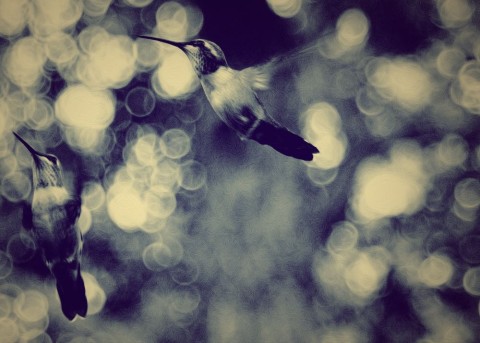The first few times Mom pulled me away from the source of my calm, she called me a mongrel like my older sister, Abby, when she discovered her naked, straddling the huge stuffed panda they’d bought her for Christmas, bouncing up and down on him, raw and red as any cowboy from the movies.
Mom called them “magpie moments” when she found me licking the lime green wall in the bathroom. We didn’t have locks on the doors so she’d walk in and find my tongue against lead paint, thinning out an area just above the toilet into a softer shade of sick. “You know why?” she’d yell. “Magpies eat anything and everything, just like you, you twisted little beast.”
“Why isn’t there a return policy on you people?” Mom asked the air around us. She used to grip bits of us in her teeth, trying to rip the crazy out of our essence, cutting away elbows and knees with her incisors. It hurt, but I kept licking walls and Abby kept humping things.
We each had an avenue that Mom couldn’t help but run into when she turned a corner, but her tiny vodka bottles stamped out our identities as though we had fake passports. Shapes inside Mom that had been hostile and expected a certain recipe out of us became shadowed, spongy cotton that absorbed and cushioned the blows when she was drunk. She gave us up to Dad while she lay on the couch with the Times crossword puzzle until she passed out.
October was when I first eyed a gym sock in a way I’d never imagined. It was white with a blue stripe, sat in the laundry basket with the rest of the clothes. I don’t know what transformed it into brilliance as exquisite as the lime green wall I licked. I separated it from the rest of the pile and stuffed it in the back pocket of my jeans.
Attentive lust tasted as salty and unbridled as the wall. I holed myself up with the sock in my room. I sucked on it like a kid with a blanket for a few hours. It edged out the dark skid marks in my mind. Humiliation and anxiety were replaced with distance from school, homework or the need to be social. At some point, the alarm clock ticked out half past two, and I’d been seduced by sections of this cotton gnarled up and balled inside my intestines. I was a snake with a mouse stuck in the middle of me. There was no exit. It wouldn’t come out the other end.
Doctors opened me up and extracted sections of sock. Psychiatrists prescribed anti-psychotic pills, which made my nose and lips waver around my face in tics. And Dad talked softly to me, as though his regular voice might bring out the beast, always with the question, “Why?”
Every photo is Abby and me lined up and hostile, in matching outfits, while behind the camera Dad yelled through wind, “smile,” “relax,” “be yourself.”
Three times I was beholden by a sock. The operations were intense. Socks obstructed the intestinal tract and had to be evacuated by surgeons.
Mom studied me over her cup of coffee and crossword puzzle one morning. If I encased her face in plaster-of-Paris, her lidless eyes and skyline lips would encompass a whole city of disappointment. She smiled at me, though. “The toughest part is when I realize there are blanks I can’t fill in no matter how many times I revisit a puzzle. I actually have to burn the newspaper, because I can’t stand to see those empty spaces leering back.”
My gaze held the hollow of me in place like a damn continent when Mom began to cry.

Notes from Guest Reader Daniel DiFranco
Privacy and inner worlds collide within a fractured family—a family that is being consumed by its coping mechanisms. There’s a violent exfoliation to Meg Tuite’s writing. She shows us the characters open and raw to each other while they pretend, self-medicate, and continue the cycle. Is it nature or nurture? Meg Tuite describes decomposition and trauma with a stunning mastery over simile and metaphor without ever slipping into melodrama or the saccharine.


 Included in the price of SmokeLong Fitness:
Included in the price of SmokeLong Fitness: